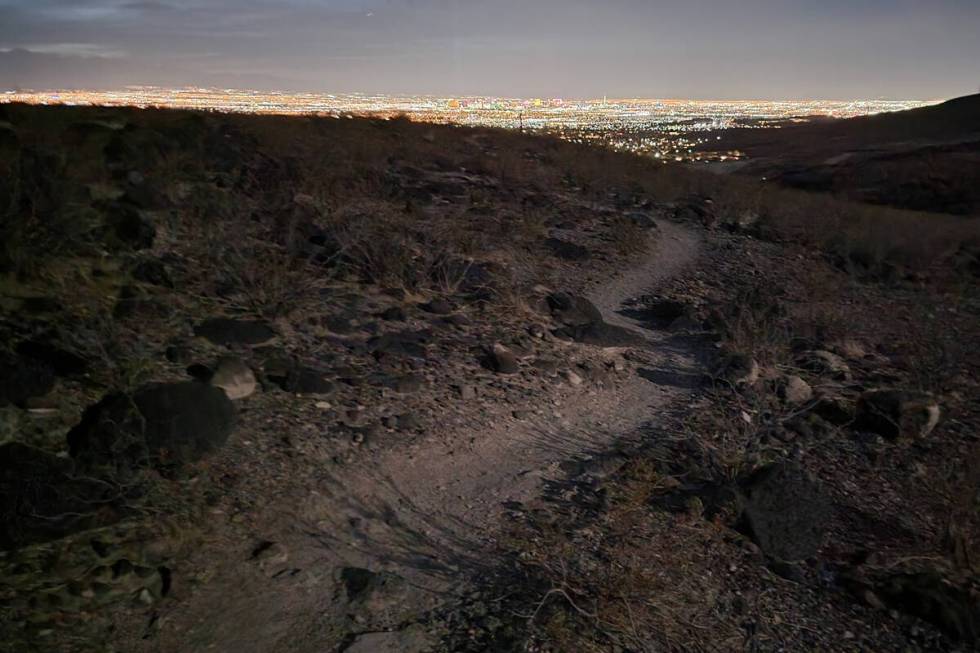Try night hiking to defy Las Vegas summer heat

Some intrepid Southern Nevadans choose paths of darkness in their bid to keep hiking adventures alive during sizzling summer months.
A preferred night-hiking venue is Sloan Canyon National Conservation Area on the southern end of the Las Vegas Valley. The views of the Strip are spectacular, and the paths above Anthem Hills neighborhoods are wide and manageable enough to cross the dusty, uneven Mojave Desert terrain with confidence. Previous daylight experience hiking in the area will make trekkers more comfortable with the idea of headlamp light and moonbeams helping to guide their way in the dark.
The moon will be full on July 13 and Aug. 11, and there’s magic in watching the full moon rise above the ridgeline and then shine its light for trail navigation. Familiar Sloan Canyon trails reveal unfamiliar sounds and sights at night, such as the distinctive birdcall of a poorwill and the frenetic scurrying of bug-eyed desert kangaroo rats. Desert hairy scorpions can be spotted, and rattlesnake encounters are a possibility (an unfortunate one for any worriers in the trekking party).
Moonlight casts playful shadows of occasional Joshua trees and Mojave yuccas found along the trails. Bats fly about. Coyotes howl. Tranquility and quiet mix with nervousness about putting one foot in front of the other in the dark.
Nighttime temperatures can remain in the 90s during July and August, but at least the blistering sun doesn’t beat down on hikers. A good time to start a night hike is a half-hour before sunset, especially if there’s a wispy layer of unthreatening clouds on the western horizon. Sunsets can be stunningly gorgeous on trails above the Shadow Canyon and Anthem East trailheads, both of which grant hikers access to Sloan Canyon National Conservation Area and its sparkling views of the Strip.
There are a few things night hikers should check off their lists before hitting the trail: sturdy hiking shoes (loose rocks are part of desert trail life), hiking poles or walking sticks, plenty of water, snacks (not just trail mix and turkey jerky; include treats like cookies and chocolate), a pair of binoculars to see craters on the moon, headlamps and a second reliable source of light, such as a flashlight. Some headlamps have a red light feature, which adds illumination but allows eyes to remain adjusted to the dark.
A route my family has chosen on three full-moon nights is a rocky loop of moderate difficulty that starts at Shadow Canyon trailhead. The trails we use are numbered 403, 402 and 404 by the Bureau of Land Management. It’s a less-than-straight-forward loop made from the trails that lead up to Park Peak (403) and Black Mountain (404), but we use a connector trail (402) to follow a moderate loop and avoid taking more challenging ascents to the peaks. We wear headlamps, but the idea is to let our eyesight adjust as the light fades to twilight and then to semi-darkness. After we watch the full moon peek over and then rise above the McCullough range, it lights our path back to the parking lot for a roughly 3½-mile trip.
Depending on the clouds, shortly after our start on the 403 Park Peak trail, we enjoy incomparable sunsets when yellows, oranges, reds and purples deepen and then darken. Below the dramatic sunset clouds (or clear skies), millions of Las Vegas Valley lights begin brightening up. It’s semi-dark by the time we reach the connector 402 trail, and the moon has usually risen by the time we reach the 404 Black Mountain trail and are returning to the parking lot. As the skies darken and the 403 trail becomes steeper on its climbs toward Park Peak, the terrain becomes rockier and more uneven. An option at that point is to turn around and retrace your steps back to the car. But if nervousness hasn’t overtaken the trekking party and everyone is feeling sure-footed despite the darkness, turn onto the 402 connector, which stretches to the left and connects with the 404 Black Mountain trail to loop back to the parking lot.
Night hiking, with a bonus of full-moon magic when timed right, can be the cure for Southern Nevadans suffering air-conditioned cabin fever and wishing to defy the summer heat and hit the trail.